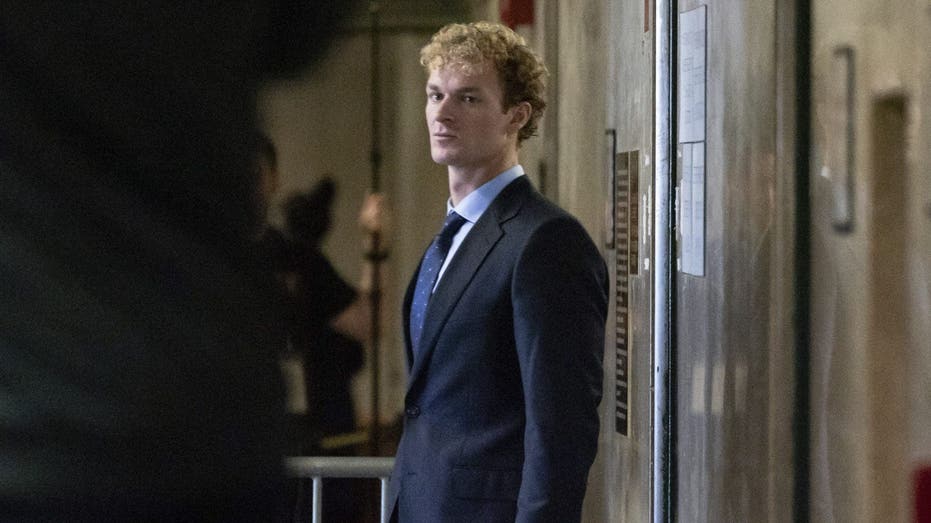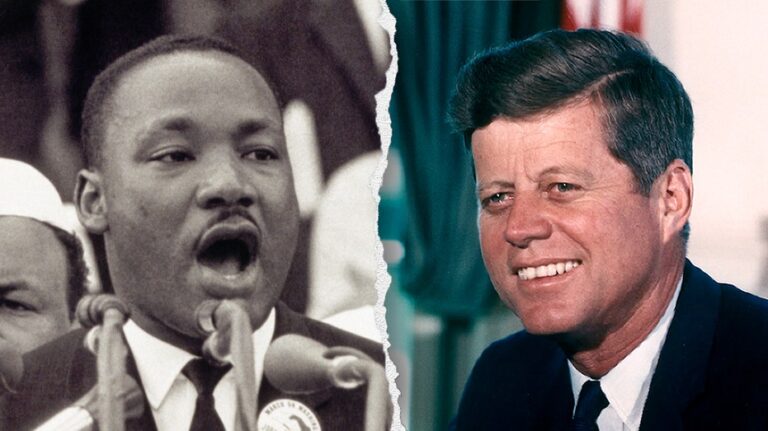
The subway rider seen on video helping Marine vet Daniel Penny hold down Jordan Neely after an outburst on a Manhattan train took the witness stand and revealed he lied to District Attorney Alvin Bragg’s office when investigators first interviewed him.
Eric Gonzales, a 39-year-old father of two, gave testimony during Penny’s trial Tuesday after prosecutors agreed not to charge him in exchange for testifying in Penny’s manslaughter trial, telling the court he said aloud that the former serviceman was not squeezing “tight enough” during the altercation.
“He’s their main witness, and his credibility was shot after being confronted with this,” said David Gelman, a Philadelphia-area defense attorney and former prosecutor who has been closely following the case.
Although he initially gave detectives a different story, he arrived after Penny had already taken Neely down.
“Everybody was frantic and saying, call the cops, call the cops,'” Gonzales said. “I see those two individuals on the floor, so I assumed one was trying to restrain the other until the cops came.”
Gonzales’ evolving story could be fodder for the defense, according to experts.
“Any witness that lies, at any time during the case, loses credibility and a good defense attorney will exploit that,” said Louis Gelormino, a Staten Island defense lawyer who has tried two cases in front of Judge Maxwell Wiley, who is overseeing the Penny trial.
Neely barged onto the train, threw his jacket on the floor, raised his fists and started making death threats, according to witnesses.
Gonzales said that when he arrived on the scene, he waved his hand in front of Penny’s face to let him know he was jumping in to help and then grabbed Neely’s arms and held them.
“I said I was gonna grab his hands so you can let go, giving him a different option to restrain him until police came,” he testified. “If I held his arms down he could let go of his neck. I didn’t think anything of it at the moment, I was just giving him an alternative.”
Neely continued to struggle, but the two continued to hold him down, waiting for the police. Gonzales said he did urge Penny to loosen his grip but later told him to grab tighter.
JUDGE DENIES MARINE VET DANIEL PENNY’S MOTION FOR MISTRIAL IN SUBWAY CHOKE HOLD CASE DESPITE ‘BIAS’
“Jordan Neely tapped on another individual who was kneeling by Penny’s head saying to let him go, he wanted to be released,” Gonzales said. “I told him, ‘We’re not gonna let you go.’”
Bystander video that prosecutors played in court shows Gonzales telling Neely, “We’re not gonna let you go until the cops arrive.”
As the three struggled on the floor, Gonzales said another rider was delivering commentary on a FaceTime call.
WATCH: Defense attorney breaks down Marine vet’s motion for a mistrial in subway chokehold death
“We were struggling at the time, and I see an individual who was FaceTiming with his wife saying something along the lines of if he has a poop stain on him that means he’s gonna die or pass out,” Gonzales testified.
Other witnesses previously described how Neely “smelled like soiled sweatpants” when he barged into the train and started making threats. Gonazles said he acknowledged a brown stain on his pants – but “it was old.”
“It was a dry stain he had on his pants,” he said.
He said he was frustrated with the FaceTimer because he was talking but not helping.
“I was doing everything possible to basically shut him up,” he said. “At one point he was telling Daniel Penny not to hold too tight or said he was holding too tight. To try to dismiss him and shut him up, I said that Penny wasn’t holding on tight enough.”
Under cross-examination, Gonzales said he originally told prosecutors that when he said Penny was not squeezing hard enough, he saw a gap between his arm and Neely’s chin, and Penny’s arm was on his chest, not around his throat.
He said part of the concern as the two held Neely down was that he might “fight or escape” before police arrived. He remembered telling detectives that Penny was restraining but not choking Neely, but on the stand backtracked and said he had only made “an assumption” and that Penny’s arm was “against his neck.”
At some point, Neely went limp, and he let go. Penny let go shortly thereafter, Gonzales testified. He said he checked for a pulse and found one before stepping away.
He left and continued his workday and learned of Neely’s death in a newspaper the following morning, when a coworker showed him he was in a photo at the scene.
“I took all my vacation time – I went into hiding in other words,” Gonzales said.
Police found him about a week after the incident, and he then met with an assistant district attorney (ADA). He testified that he remembered being scared about “getting pinned for a murder charge.”
Then, he said, he lied to prosecutors, telling them he arrived at the altercation earlier than he really did and that Neely hit him first.
PROTESTERS ACCUSE MARINE VET OF WHITE SUPREMACY AS JURY SELECTION BEGINS IN SUBWAY VIGILANTE CASE
“I fabricated a story to the ADA – I lied to the ADA,” he said. “I told the ADA that as things were transpiring, [that] I was there on-site when everything went down. I told the ADA that Neely had struck me first, and then everything went down.”
However, prosecutors already had photos of him at a turnstile at the time Penny first grabbed Neely.
“I saw a still photo of me just finishing swiping my Metro card at the time,” he said.
During this interview, he also told prosecutors that he asked Neely if he was OK after letting go, and Neely said yes.
Prosecutors later offered him immunity in exchange for testifying against Penny, he said.
The defense asked the court about investigators’ notes during the Gonzales interview, saying only a few had been provided in discovery. Prosecutors claimed they had turned over everything they had.
Gonzales also said he’s still scared about testifying despite the prosecution’s immunity offer – saying he believes he or his family could be harmed if he testifies in favor of Penny.
“The DA is making this a race case,” Gelman said. “So they are thinking, OK we know there are issues here including weak witnesses and others who are contradicting the DA narrative, but the person who died is Black because of a White man. We will roll the dice.”
Penny faces up to 19 years in prison if convicted of manslaughter and criminally negligent homicide.
He is not accused of murder or a hate crime – but his defense team repeatedly objected to the prosecution’s attempts to highlight racial undertones in the case last week, moving to declare a mistrial and asking the judge to strike testimony from a “biased” witness.
The subway rider seen on video helping Marine vet Daniel Penny hold down Jordan Neely after an outburst on a Manhattan train took the witness stand and revealed he lied to District Attorney Alvin Bragg’s office when investigators first interviewed him.
Eric Gonzales, a 39-year-old father of two, gave testimony during Penny’s trial Tuesday after prosecutors agreed not to charge him in exchange for testifying in Penny’s manslaughter trial, telling the court he said aloud that the former serviceman was not squeezing “tight enough” during the altercation.
“He’s their main witness, and his credibility was shot after being confronted with this,” said David Gelman, a Philadelphia-area defense attorney and former prosecutor who has been closely following the case.
Although he initially gave detectives a different story, he arrived after Penny had already taken Neely down.
“Everybody was frantic and saying, call the cops, call the cops,'” Gonzales said. “I see those two individuals on the floor, so I assumed one was trying to restrain the other until the cops came.”
Gonzales’ evolving story could be fodder for the defense, according to experts.
“Any witness that lies, at any time during the case, loses credibility and a good defense attorney will exploit that,” said Louis Gelormino, a Staten Island defense lawyer who has tried two cases in front of Judge Maxwell Wiley, who is overseeing the Penny trial.
Neely barged onto the train, threw his jacket on the floor, raised his fists and started making death threats, according to witnesses.
Gonzales said that when he arrived on the scene, he waved his hand in front of Penny’s face to let him know he was jumping in to help and then grabbed Neely’s arms and held them.
“I said I was gonna grab his hands so you can let go, giving him a different option to restrain him until police came,” he testified. “If I held his arms down he could let go of his neck. I didn’t think anything of it at the moment, I was just giving him an alternative.”
Neely continued to struggle, but the two continued to hold him down, waiting for the police. Gonzales said he did urge Penny to loosen his grip but later told him to grab tighter.
JUDGE DENIES MARINE VET DANIEL PENNY’S MOTION FOR MISTRIAL IN SUBWAY CHOKE HOLD CASE DESPITE ‘BIAS’
“Jordan Neely tapped on another individual who was kneeling by Penny’s head saying to let him go, he wanted to be released,” Gonzales said. “I told him, ‘We’re not gonna let you go.’”
Bystander video that prosecutors played in court shows Gonzales telling Neely, “We’re not gonna let you go until the cops arrive.”
As the three struggled on the floor, Gonzales said another rider was delivering commentary on a FaceTime call.
WATCH: Defense attorney breaks down Marine vet’s motion for a mistrial in subway chokehold death
“We were struggling at the time, and I see an individual who was FaceTiming with his wife saying something along the lines of if he has a poop stain on him that means he’s gonna die or pass out,” Gonzales testified.
Other witnesses previously described how Neely “smelled like soiled sweatpants” when he barged into the train and started making threats. Gonazles said he acknowledged a brown stain on his pants – but “it was old.”
“It was a dry stain he had on his pants,” he said.
He said he was frustrated with the FaceTimer because he was talking but not helping.
“I was doing everything possible to basically shut him up,” he said. “At one point he was telling Daniel Penny not to hold too tight or said he was holding too tight. To try to dismiss him and shut him up, I said that Penny wasn’t holding on tight enough.”
Under cross-examination, Gonzales said he originally told prosecutors that when he said Penny was not squeezing hard enough, he saw a gap between his arm and Neely’s chin, and Penny’s arm was on his chest, not around his throat.
He said part of the concern as the two held Neely down was that he might “fight or escape” before police arrived. He remembered telling detectives that Penny was restraining but not choking Neely, but on the stand backtracked and said he had only made “an assumption” and that Penny’s arm was “against his neck.”
At some point, Neely went limp, and he let go. Penny let go shortly thereafter, Gonzales testified. He said he checked for a pulse and found one before stepping away.
He left and continued his workday and learned of Neely’s death in a newspaper the following morning, when a coworker showed him he was in a photo at the scene.
“I took all my vacation time – I went into hiding in other words,” Gonzales said.
Police found him about a week after the incident, and he then met with an assistant district attorney (ADA). He testified that he remembered being scared about “getting pinned for a murder charge.”
Then, he said, he lied to prosecutors, telling them he arrived at the altercation earlier than he really did and that Neely hit him first.
PROTESTERS ACCUSE MARINE VET OF WHITE SUPREMACY AS JURY SELECTION BEGINS IN SUBWAY VIGILANTE CASE
“I fabricated a story to the ADA – I lied to the ADA,” he said. “I told the ADA that as things were transpiring, [that] I was there on-site when everything went down. I told the ADA that Neely had struck me first, and then everything went down.”
However, prosecutors already had photos of him at a turnstile at the time Penny first grabbed Neely.
“I saw a still photo of me just finishing swiping my Metro card at the time,” he said.
During this interview, he also told prosecutors that he asked Neely if he was OK after letting go, and Neely said yes.
Prosecutors later offered him immunity in exchange for testifying against Penny, he said.
The defense asked the court about investigators’ notes during the Gonzales interview, saying only a few had been provided in discovery. Prosecutors claimed they had turned over everything they had.
Gonzales also said he’s still scared about testifying despite the prosecution’s immunity offer – saying he believes he or his family could be harmed if he testifies in favor of Penny.
“The DA is making this a race case,” Gelman said. “So they are thinking, OK we know there are issues here including weak witnesses and others who are contradicting the DA narrative, but the person who died is Black because of a White man. We will roll the dice.”
Penny faces up to 19 years in prison if convicted of manslaughter and criminally negligent homicide.
He is not accused of murder or a hate crime – but his defense team repeatedly objected to the prosecution’s attempts to highlight racial undertones in the case last week, moving to declare a mistrial and asking the judge to strike testimony from a “biased” witness.



